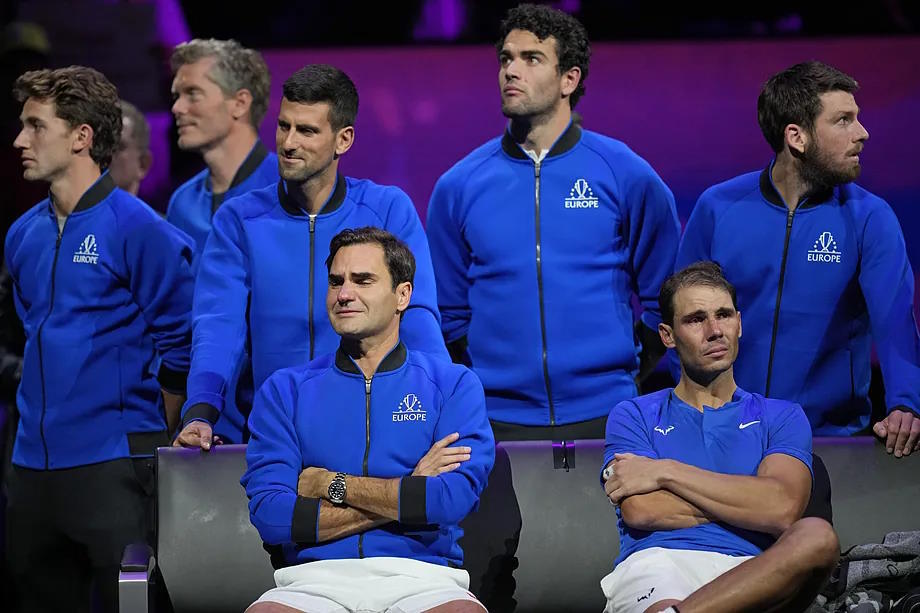22 Grand Slam titles, 92 ATP titles, five Davis Cups, two Olympic gold medals, over 1,000 victories... Rafa Nadal retires with a full backpack, having conquered all possible achievements, but what does he leave for the future? Every farewell of a legend in the world of sports is observed by thousands of boys and girls imitating their gestures, and the same happens with the Spaniard, although his shadow is unique. Nadal can be imitated in many aspects, should be imitated in many aspects, except on the court.
Rafael Nadal, the man who transcended sports
"No one will play like him again because one should not play like him. In the first part of his career, the one that built Nadal as a myth, he played four or five meters behind the baseline. He could do it because of his physical strength, his mentality, and the acceleration he gave to the ball, but it was extremely unusual, I would say a unique case in history," analyzes Argentine journalist Sebastián Fest, founder of the magazine Clay and author of the book Gracias: El legado de Rafael Nadal.
In his words, the impossibility of finding an imitator. While Roger Federer already has disciples like Grigor Dimitrov, and Novak Djokovic succeeded with a more recognizable style, no one on the circuit resembles Nadal, and possibly no one will. Despite being compared to him many times due to being Spanish and sharing certain traits with him, Alcaraz's playing style is completely different.
"His tennis is not the best example"
"In reality, Nadal's tennis is not the best example for young players, and that is why it is very difficult for someone to play like him. Coaches do not want their students to imitate him because they would need his physicality and his topspin. But in academies around the world, Nadal is seen as a role model in terms of attitude. That ability to concentrate, that performance in every point is an example, the best example. In fact, Nadal taught us that you don't have to be a robot, that you can be nervous and emotional, but still, you must be focused on every point," points out British journalist Simon Cambers, who works for The Guardian or Reuters and is the author of the book The Roger Federer Effect, adding: "As strange as it may seem given his numbers, the legacy of Nadal as a person is more important than his legacy as a tennis player."
Despite the sophistication and courtesy that surrounds tennis, the kindness that Nadal maintained during his reign alongside Roger Federer and Novak Djokovic has not always been the norm, far from it. Nadal leaves behind a unique way of playing, but also a perfectly imitable way of being: you just have to be polite. In the era of Jimmy Connors, John McEnroe, Bjorn Borg, or Ivan Lendl, where animosity prevailed, and in the subsequent era dominated by Andre Agassi and Pete Sampras, rivalry also spread, Nadal and his contemporaries showed that legends should not be fueled by hatred.
His cordial relationship with Djokovic and, above all, his friendship with Federer stand as a paradigm on which to build the future of tennis. Today, perhaps due to a certain rebound effect, tensions between players are exaggerated, but a closeness is growing between Carlos Alcaraz and Jannik Sinner under the shelter of what the former built. The current top two players in the world, capable of sharing a private plane trip, undoubtedly look to the unity between Nadal and Federer.
"If you talk to younger players about Nadal, most of them will tell you he was great, but they won't say they want to play like him, they will say they want to be like him. His humility, his greatness, his respect for the opponent... That is his greatest legacy, and in that regard, of course, his relationship with Federer comes into play. They showed that you could compete for the most important titles while maintaining respect on the court, in victory and in defeat," observes Howard Fendrich, a tennis specialist for the American agency Associated Press and current co-president alongside Cambers of the International Tennis Writers Association (ITWA).
"With his track record, it may seem strange, and indeed it is strange, but for me, one of the most important photos of his career is the one taken at the Laver Cup, crying at Roger Federer's retirement, giving him his support, for all that it signifies," adds Fendrich, who like the rest of those consulted assumes that there will be no other Nadal on the court, but hopes that off the court, he will have many disciples.
